- Home
- S. E. Hinton
Some of Tim's Stories Page 8
Some of Tim's Stories Read online
Page 8
Definitely. Ponyboy is so much like me. But as you get older, you appreciate other qualities in people or hidden qualities in yourself. Travis is very different from me, and he’s certainly different from me as a teenager, though some of his thoughts on writing and some of his experiences in getting his book published were very similar to mine. As a mature writer, you realize there are other people/characters in the world besides you.
Where do you think Ponyboy, your alter ego, would be today?
Ponyboy would be writing mystery novels under the name of P. M. Curtis.
Movies
Hollywood meets Tulsa. —S.E.H.
JULY 20, 2006—TULSA, OKLAHOMA
It is already 105 degrees by the time I get to Susie’s, and she is waiting at the front door for me so I don’t have to ring the doorbell. Hers is a quiet life—no unnecessary doorbells ringing, no music playing in the background, no television voices emanating from back bedrooms. Before we start taping, she explains that she prepares for heat waves the same way she prepares for snowstorms, stocking up on everything she might need so she won’t have to leave the house. Extremes, I suspect, have become her discipline, and as she sits barefoot on her favorite couch, her only concern is that readers understand that she is not Cherry Valance, that she is not a Soc. As if on cue, we’re interrupted by a double whistle. “That’s the two o’clock bird,” Susie explains, acknowledging a clock her son has given her. “There’s a different bird call every hour, but I only know the birds by their times, not their species.” We also listen as Aleasha sighs in the background and as the day’s mail takes its own time sifting through the window slot. Otherwise, the house pretty much stays on low volume and even routine conversations resonate.
Like you, Ponyboy Curtis in The Outsiders loves movies. What extended role did movies play in your life when you were growing up in Tulsa?
As a kid I was just interested in seeing a good story. I can’t tell you how many times I watched Old Yeller. The first movie I ever saw in my life was Peter Pan. I was five, and my mind went berserk with all those images, all that story. I developed a huge crush on red-headed boys all through grade school. I used to think of myself as a movie buff, but later in life I met movie buffs, and I lag way behind. But I’ve always been interested in movies as a form of storytelling.
What were some of your other favorite movies when you were a teenager, Ponyboy’s age?
I liked Lawrence of Arabia, but I was a little older than Ponyboy when I saw that. And Bye Bye Birdie—I thought it was great. Then, of course Disney movies, especially the documentaries on animal life. In my twenties I had a couple of traumatic movie experiences, one with The Godfather. Little did I know that Mr. Coppola and I would have a relationship one day. But I got so involved with the movie that, when it got violent, I came out of it shaking. And very shortly afterward, I saw In Cold Blood. I had read the book but didn’t expect the flashback to the actual murders. I was so traumatized I quit seeing movies for a couple of years. I’ve always liked sci-fi; Bruce Dern’s movie Silent Running is still one of my all-time favorites. I also like good scary movies—The Haunting, The Others.
When I was younger I was more intrigued with movie stars than movies; I have the feeling it was just the opposite for you.
When I was in grade school, I was totally entranced with Little Joe Cartwright. I couldn’t have cared less who Michael Landon was, but Little Joe Cartwright was such a hottie. As I grew older, I wasn’t the kind to form actor crushes, but I really like actors. I’ve found that they talk like writers, except there’s absolutely no sense of competition, so you can have a good conversation with them.
Ponyboy “loned” it at the movies, because he felt that going to the movies with friends was like having someone read over your shoulder. Do you ever “lone” it at the movies?
Occasionally. I did with Brokeback Mountain. I ran out of people to see it with but wasn’t through seeing it myself. I was going to see it once a week for a long time.
When you were writing your early novels did you see them as movies in your mind’s eye?
I just saw them as books. I wasn’t even sure, especially with The Outsiders, that I wanted them to be movies.
Why do you think Tex was the first of your books to make it to the big screen?
My fans helped me with Tex. Tim Hunter, who later directed Tex, had done a screenplay called Over the Edge, and he told me later that whenever he asked kids on the set what they read, they said S. E. Hinton. Matt Dillon, who was one of the actors in Over the Edge, even said, “Like, man, if you ever do get an S. E. Hinton movie going, I want to be in it.” Disney was going into PG movies and called me. At first I didn’t want Disney to do the movie—I mean, Tex Meets the Seven Dwarfs. The next thing I knew, an executive from Disney was on my doorstep wanting to go to lunch.
On your doorstep in Tulsa?
On my doorstep in Tulsa! We went to lunch, and he offered me the standard amount for a young adult film; I told him the money was okay. He asked if I’d like an expense-paid trip to Disneyland, and I said sure, I loved Disneyland. But I was still just staring at him, and he finally asked what else it was that I wanted. I said, “I’ve got a horse that’s perfect for the horse part.” My horse got the role, and Disney got the book. Toyota played Tex’s horse in the movie and did a wonderful job. He loved the movie-making process. He just knew all of those cameras and lights were for him. And he adored Matt Dillon, Tex. Matt came in early, and I gave him riding lessons for a couple of weeks. I also taught Matt to always have carrots in his pocket. There’s a scene in the movie where Toyota is nuzzling Matt’s pockets, looking for his carrots.
A lot of writers aren’t even allowed on the sets of their films. How involved were you with Tex?
The director, Tim Hunter, came to Tulsa and asked if I wanted help scout locations. I drove him to the Camelot Inn, across the street from where Tex tried to make a phone call after being shot by a drug dealer. And I drove him out to Bixby, where I lived, and showed him the area. Scouting locations is so funny. You just drive around until you see something you like, walk up to the door, and say, “We’d like to put your house in our movie.” It’s amazing. People always say, “Yes, take the house! You like the dog, take the dog; you like the kid, take the kid!” Then he had me help on wardrobe; he let me in on everything. One day when he was shooting a scene from a big, high angle, there wasn’t room for anybody but essential crew on the platform, but Tim got me on, and I got to watch that shot.
You said in a previous interview that Tex is your favorite of your young adult novels. Was it hard, even though you liked Tim Hunter, to turn your story over to him?
After I talked to Tim, I wasn’t afraid of him, but after my first meeting with Matt, I was scared to death of him. Tim had told me: “I’ve got this kid. He’s going to be big, and he wants to do Tex.” So, I’m in New York, imagining Little Bixby Cowboy, when up walks this street punk, who says, “Hey, S. E., I thought you was a man!” And I thought, Oh, dear! I hope this kid’s a good actor, ’cause he can’t play himself. Matt later told me one of the hardest things for an actor to do is to act innocent when he isn’t. I still think Tex is one of his best performances.
How did you come to make your acting debut in the film?
Tim asked if I’d do a cameo. After weeks of watching other actors, I thought it looked easy, so finally I said okay. He cast me as the typing teacher, and at first I got nervous, but it worked great. The typing teacher is supposed to be a wreck; the kids had put caps on the typewriter keys. I ran in, hit my marks, and said my lines without even glancing down—did it in a couple of takes.
What was it like seeing Tex in the theater for the first time?
It was great, especially since it opens with a long montage—Matt riding Toyota. Anytime I think of Toyota now, I can get out the DVD and see him in his prime.
Did Toyota develop
a star complex at all?
He had a big ego to begin with—he was a champion jumper—but for months after the movie I couldn’t get him to move without yelling “Action!”
What sort of synchronicity brought Francis Ford Coppola into your life?
A group of kids in California wrote Francis a letter, telling him The Outsiders was their favorite book and asking him to please make it into a movie. Francis was intrigued—he really does love kids—and had his producer get in touch with me. For years I’d had people calling me, saying they were interested in doing The Outsiders, but I was afraid it was going to end up being Ponyboy Meets Beach Blanket Bingo. So I was reluctant to hand over The Outsiders to anyone until I realized I was talking to Francis Coppola’s studio. Just a couple months before, I’d seen The Black Stallion, and had thought that if that movie had been based on one of my books, I would have been thrilled.
Since you were such a fan of Coppola’s work, were you nervous at all about meeting him?
Francis was holding huge casting calls all over the country, one in downtown Tulsa, and I went to the auditorium. I was nervous about meeting him, and as I walked down the aisle, I realized he was kind of nervous about meeting me. So I walked up, shook his hand, and told him, “Mr. Coppola, I do have a problem with your doing The Outsiders. The Godfather is better than the book, and The Black Stallion is better than the book. Are you going to do that to me?” He laughed—and relaxed. So did I. After I drove him around some Tulsa neighborhoods, he decided he wanted to shoot on location. He asked me to help with the script and with the wardrobe. I was going, “Yeah, I can do this; I’m experienced.”
How well did you and Coppola work together when you actually started developing the screenplay? To borrow Ponyboy’s phrase again, you’d pretty much “loned” it as a writer.
Francis took a copy of the book, outlined the introspection in one color, the action in one color, the dialogue in one color. Then he cut it up and literally pasted it on sheets in the form of a screenplay and had someone type it up that way. By the time he handed it to me, it was the size of a phone book, and he asked if I minded cutting it for him. I hadn’t done any writing on the script for Tex, except once in a while, when Tim would say he needed transition lines. But I’d learned a lot about movies from watching what Tim did with the script. He always said you cannot have actors saying more than three sentences or it sounds like they’re giving the preamble to the Constitution. So I was interested in keeping The Outsiders moving.
You were in your thirties when you were working on the screenplay. How did it feel coming back to your story as an older writer?
I had learned to accept a lot of the book, partially because of the response to it. But I couldn’t help coming up with better lines and dialogue. Francis had no problems with anything I cut, but if I changed a line, he’d ask if that was how it had been in the book. And I’d say, “No, but it’s better.” Then he’d remind me that we were making the movie for the readers and needed to keep it like it was.
Many of the film stars—Matt Dillon, Patrick Swayze, Emilio Estevez, Tom Cruise, Diane Lane—went on to become show-business superstars. Did you see that potential in them as you watched them on the set?
I don’t know what virtue there is in being able to see talent in front of your face, but it was obvious that they were going to be great. I actually got Francis to ask Matt to read for Dallas, because I thought he would be perfect for the part. After Matt’s first reading, Francis told him to go home, and Matt thought he’d blown it. He didn’t find out until later that Francis was saying, “You’ve nailed it; go home!”
You’d also worked with Emilio Estevez before, on Tex.
Emilio was very professional, but he was so good at improv. The whole scene in The Outsiders where he looks like he’s going to help Ponyboy clear the table but takes the chocolate cake and a beer and sits down in front of the TV—that was total Emilio. Another time when Two-Bit, Johnny, and Ponyboy were walking home from the movies, a hat blew by, and Emilio grabbed it and put it on. It had blown off the head of a cameraman. Emilio just used it as an opportunity.
You mentioned how closely you collaborated with Matt on Tex. How closely did you work with the actors on The Outsiders to give them new insight into the characters?
I worked with the actors quite a bit. They were turned loose here in Tulsa with no adult supervision, and I immediately took it upon myself to be their mother. Rob Lowe even called me “Mom” half the time. I’d run lines with the boys. They were really sweet kids. I tried not to go to the hotel where they were staying very often, because I knew, even as a mother, there would be only so much that I could do, and I really didn’t want to know what was going on. The night the Socs were drowning Ponyboy in the movie, the other cast members, in a show of camaraderie, were pretending to drown each other in the hotel fountain. A few years later, I went back to the hotel and the fountain was gone. I think I know why.
C. Thomas Howell played Ponyboy, the character you say is most like you.
Yes, and he had the flu—bad—the night we were drowning him in the fountain. It was in the upper thirties. We did have heaters around, but by the time you were dragged out of that fountain and put in front of a heater, you could get pretty cold. Tommy toughed it out, though. Nobody whined.
Have you stayed in touch with the cast?
I’ve stayed in contact with Matt more than the others. He lives in New York, and I visit the city a lot. As for the rest of us, we can go years without getting together, but when we do, we pick up where we left off, so that’s nice. Emilio and I e-mail once in a very great while. Tommy Howell and Ralph Macchio came back to Tulsa in 2006 for the premier of The Outsiders: The Complete Novel, the new DVD edition of the movie. And that was so much fun. They hadn’t changed a bit. Between interviews we took the limo that was at our disposal and visited our old haunts where we’d shot the film—the park, the Curtis house. Johnny’s house had a pig on the porch, which was kind of startling. The same man who lived in the Curtis brothers’ house during the shoot is still living there. He came out on the porch and talked to us. He said people from all over the world come to take pictures of that house.
How important was it to you for the movie to be shot in Tulsa?
It was great for me, because I got to go home at the end of the day instead of having to head back to a hotel. And the movie really looks like Tulsa, not L.A. One night when I was fourteen, a girlfriend and I were watching a movie at the Admiral Twin Drive-In and saw some “hoodie” guys trying to pick up these Soc girls. A few years later, I wrote that incident into the The Outsiders. When Francis came into town, the Admiral Twin was one of the first places I showed him.
Didn’t you once drive past the Admiral Twin Drive-In at Tulsa and catch a glimpse of your Outsiders characters at the drive-in themselves, watching a movie within a movie?
Many years later, as I was driving home from the airport, I looked over toward the Admiral Twin and saw the drive-in scene from The Outsiders playing on the screen. It was like looking into mirror, into mirror, into mirror—way back to that time when I was fourteen.
Your talent brought all of this wonderful artistry to your hometown, but after the films were over, your new colleagues moved on to other projects, other cities. Have you ever considered relocating?
No, I’ve never considered relocating. In fact, halfway through The Outsiders, Francis said we worked well together, and he liked Tulsa, did I have anything else we could shoot while he was in town? I told him I had this weird book, Rumble Fish, but nobody got it. One day he walked in, waving the book, going, “I love this book—it’s so weird; we’ll make it weirder. We’ll shoot it in black and white; the fish will be in color. And we’ve already got a cast here.” During the shooting of Tex, Matt had told me that Rumble Fish was his favorite of my books, one of his dream roles, and if he wasn’t too old when it got off the groun
d, he wanted to play Motorcycle Boy. He said if he was really old—like twenty-seven—he’d direct.
You actually wrote the script for Rumble Fish while you were finishing up The Outsiders?
Yes, we were still shooting The Outsiders, sometimes putting in sixteen- to eighteen-hour days. Francis and I wrote Rumble Fish on Sundays, and we got the first draft done in two weekends. Tex was coming out. So at one point in my life, I was shooting a movie, advertising a movie, writing a movie. But Rumble Fish was not a fun shoot. It was hot, and we shot all of it at night. I’d made a vow that I was not going to get close to any of the actors on the new shoot. Except, of course, Matt. I just wanted to stick with my screenwriting job at that point, and I did. Rumble Fish is Francis’s movie. He did everything else.
You yourself have said that Rumble Fish was a different sort of story. Were you concerned at all in the early stages about how it would translate to the screen?
I wasn’t concerned, because Francis was one of the few people I’ve ever talked to who understood the book. It was about myth-making. The movie’s much more visual, much stronger than the book, actually. It was an amazing experience for me as a writer to see Francis’s interpretation, because it was just what I was thinking.
After your first movie appearance in Tex, you also had cameo roles in The Outsiders and Rumble Fish. What parts did you play?
In The Outsiders, I played the nurse in Dallas’s room, which was so easy, because I was so used to being hassled by Matt at that point. I was really kind of proud of myself, because I had to walk in, hit my marks, say my lines, set props down, and bump into Emilio and Tommy, who were coming to visit Matt’s character.
What about your role in Rumble Fish?
I played a hooker. When Francis asked me, I didn’t think about the fact that we’d be working with the same crew from The Outsiders. There were thirty guys on the set and two women, and I was sitting around in that hooker outfit for days, because we’d get behind on the shooting. That was not fun, though it’s funny now that I look back at it. In the scene, I end up grabbing Vincent Spano, who played Steve, and start unbuttoning his shirt. Did I do that? Oh, my God! When I watch all these movies now, they’re more like home movies. I’m thinking, that’s the day we were all sunburned, or that was the day I made Tom Cruise throw up because he ate too much.

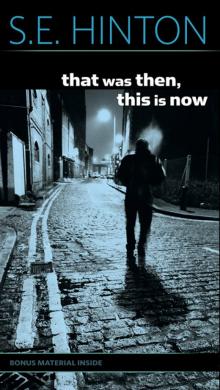 That Was Then, This Is Now
That Was Then, This Is Now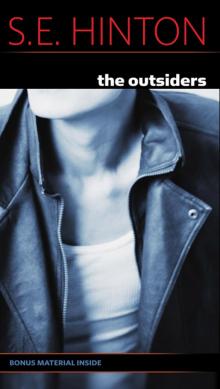 The Outsiders
The Outsiders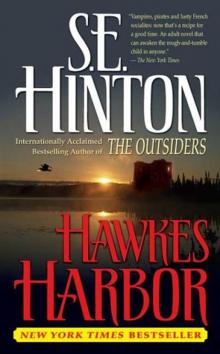 Hawkes Harbor
Hawkes Harbor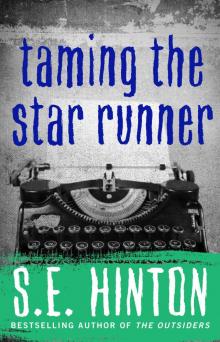 Taming the Star Runner
Taming the Star Runner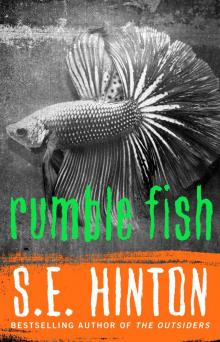 Rumble Fish
Rumble Fish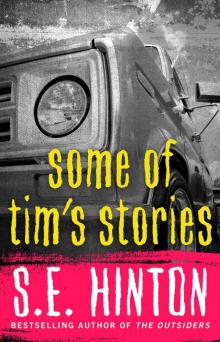 Some of Tim's Stories
Some of Tim's Stories